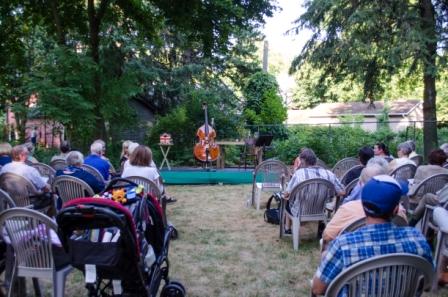by Rukhsar Jaffer
Sons of ’17, originally commissioned by Canada’s History Society for the 2014 Governor General’s History Awards Gala, was adapted by Mike Ford and Murray Foster for McCrae House’s 2016 backyard theatre productions for the month of July.
The production ran 12 shows that took place in the outdoor backyard of the historic John McCrae House from July 6th to 23rd. The production drew in over 375 people. I had the pleasure of viewing the show on the Wednesday evening during the last week of performances.
Set in 1917 during the time of World War I recruitment, the story of Sons of ’17 takes place on a stage in Guelph as two lads meet for the first time to go over music to be used in their rather unique recruitment drive. The McCrae House backyard venue offered the perfect stage that allowed the actors to incorporate the literal time, space, and audience, into their act.
As the audience waited for the show to start, World War I era pop music softly played to set the mood. Popcorn, ice cream, and soft drinks were also available for purchase to add to the theatre experience. Following an introduction by a representative of the McCrae House the evening of history, music, and theatre quickly began.
Jack Rochon, played by Mike Ford, walked into the backyard and onto the stage singing as he waited for the arrival of Eric Goodweather, played by Murray Foster, the lad with whom he was supposed to be performing with in various towns across Southern Ontario. Rochon discovers Goodweather is not as apt as he had hoped and so they decide to rehearse and perform as though “there are actually people in the chairs”, causing quite the giggle among the actual audience.
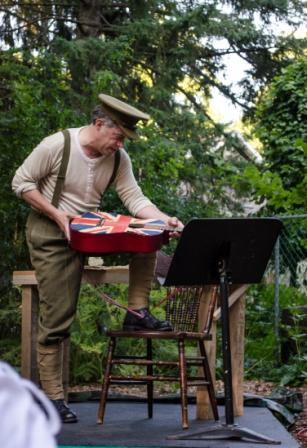
The performance was a perfectly Canadian snippet of a rather big picture of war. It included content in both French and English and touched on all sorts of aspects regarding life during wartime. Furthermore, the conversation and songs expressed an array of emotions without missing a single beat. The banter between the duo was initially playful despite the task for which they were recruiting. Foster’s character played the role of virtuousness on the homefront with pure eloquence as he interacted with Rochon. The songs and conversation then took a turn. The performance went from cheery to slightly somber and reflective. The duo not only strummed the strings of their instruments but also the strings in our hearts.
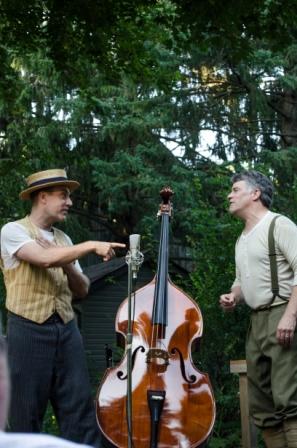
The progress of women and their role on the homefront was discussed. The experiences of those on the frontlines were also noted. What struck me most however, was the mark of respect to the unique abilities of each of the soldiers on the frontlines specifically in terms of art. When I think of war, art is not the first thing on my mind, when in fact art is quite closely related to the emotions and circumstances of war. It is through art that a lot of the happenings of war are documented. Rochon mentions that although they are all soldiers on the frontline, they are talented people. They are artists. From painters, to writers, to poets like McRae, the frontline was filled with artists in the trenches expressing and documenting what they were experiencing.
Music was important both on the homefront and on the frontlines during World War I. Music was used by governments to instill pride and patriotism, and to support recruitment efforts as was displayed in Sons of ’17. Musicians affected by the times wrote music to convey their personal sentiments and many found solace, diversion, and inspiration through music.
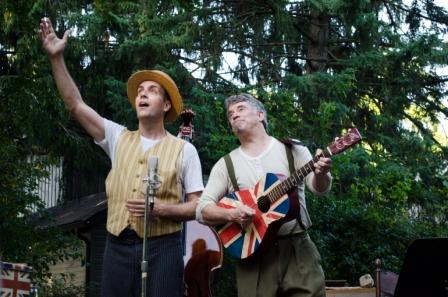
Art is and has always been a powerful tool of expression. Music has allowed us to communicate emotions in a manner all its own. By singing on the homefront as the Sons of ’17 prepare to do for their recruitment drive, there is an ability to share feelings, acknowledge sacrifices, and express emotions to all of those affected by the war, specifically the soldiers. We continue to use music to express feelings specifically in the time of adversity. There are numerous contemporary artists that create work to support various causes. We turn to music as a source of comfort and inspiration during difficult times.
Visualizing something from the past that we still do today was an eye-opening realization for me that truly exemplified the power of music. Music creates a unique window into a specific time, providing evidence of the emotion, priorities, and perspectives of the day. The show was a great insight to the days that have passed. For someone that is not always interested in history and war, it did not fail to peak my interest, making me consider the impact war has had on the everyday lives of ordinary people, people who had lives that consisted of being more than just a soldier.
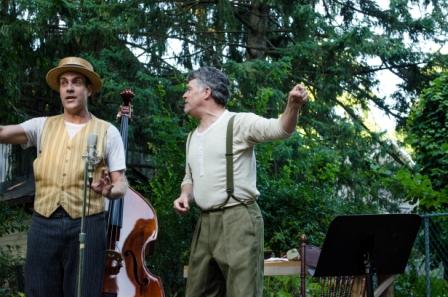
The show ended with three songs of a more modern nature to lift spirits but the performance overall definitely left me with an evening and perhaps a lifetime of rumination, appreciation, and gratitude. Specifically, the performance made me reflect on the events going on in the world today. Though my experience of war and the lack of peace is not the same as the experience of those that lived during the time of World War I, the world we live in is still working towards peace and serenity. There is currently a lot of unrest globally, making me believe that it is up to us to change our methods and raise generations that not only strive for peace but are simply able to live in peace. Like a song in the show iterates, “we do not raise our sons to be soldiers, we raise them to be our pride and joy.” The show leaves me longing for peace around the world as we face new adversities every day. We are all human, and if all mothers taught their sons not to fight, then no one would fight, it is our method that needs to be changed. It’s a plan we need to work on globally, one that will take the co-operation of “mothers and sons” i.e. people across the world.
The tale had a powerful message, one that taught me about the past and should make us reflect on the future to ensure we don’t repeat our mistakes.
This was the second year of backyard theatre at the John McCrae house. Last year the theatre presented a one act play written by local playwright Don Macrae called A Night in Flanders. John McCrae House continues to look for unique content with a focus on John McCrae’s story to present in the future.
For more work by Mike Ford and Murray Foster find them online under The Cockshure Lads.
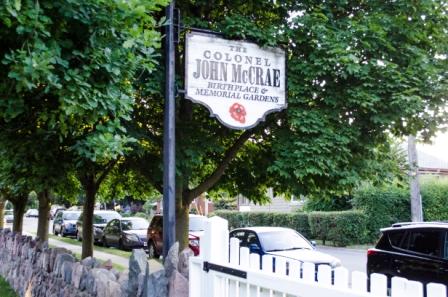
John McCrae House offers a daily tea and tour program at 2:00p.m. Visitors are invited to reflect on their experience touring the McCrae House exhibitions while enjoying tea and scones in the McCrae House Gardens.
For more information on programming at the McRae House and Guelph Museums visit guelphmuseums.ca
Photography by Rukhsar Jaffer
